This did not sit well with Isaac Mayer Wise, who wrote the following in his paper the Israelite (June 20, 1862):
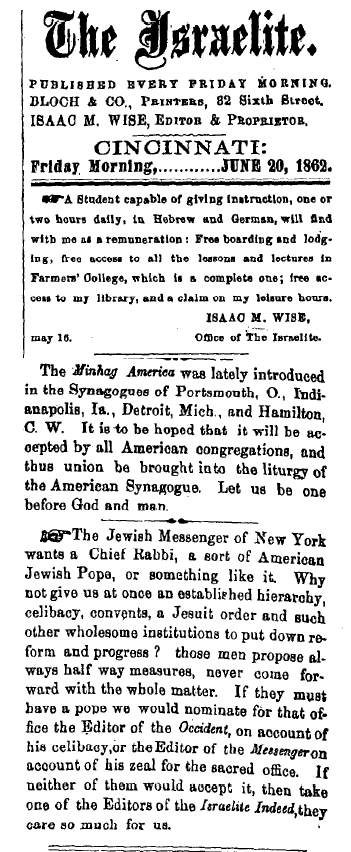
The "celibate" editor of the Occident is Isaac Leeser, who was a bachelor. Wolf2191 of Ishim ve-Shitos recently called my attention to the Letters of Rebecca Gratz, who mentions Leeser a few times. In a letter dated Feb 2, 1834 Gratz writes to her sister about Leeser's suffering from smallpox. Apparently he was self conscious about his looks to begin with, but now the resulting facial disfigurement means he probably won't get married.

Here's a picture of him where you can see his scars:

In any case, Wise's nasty comment about Leeser's personal status did not come out of the blue. Not long before Leeser had publicly questioned whether Wise was a rabbi at all (Leeser did not claim to be one) and opined that if he was then he ought to produce his semicha certificate.
Aryeh Rubinstein pointed out two later sources which discuss Wise's ordination (Isaac Mayer Wise: A New Appraisal," Jewish Social Studies 39 (1977). In the Selected Writings of Wise (1900) the editors write that he was ordained with the title Morenu at age 23 (1843) by the Prague beis din, headed by Rabbi SJ Rapoport (Shir), with Rabbis Ephraim Leib Teweles and Samuel Freund. There is no source given. Presumably it is what Wise himself had told supporters and confidants, although certainly this claim had not reached Leeser, who was in contact with Rapoport who was still very much alive, and could have been asked.
However, Rubinstein points out that in the 1919 number of the Yearbook of the Central Conference of American Rabbis there is a centennial birth tribute to Wise by Gotthard Deutsch ("who could hardly have been unaware of that claim") and the latter states that Wise was ordained by Rabbi Falk Kohn, and he had heard this from the wife of a former pupil of Wise. (Rabbi Falk Kohn is referred to as Rabbi Falk Kat"z in the responsa collection Olat Shmuel by Rabbi Shmuel Leib Kauder, link).
This comes so out of left field that one wonders if it isn't the truth. If that were so, the truth was that Wise was ordained by a rabbi of no great importance, but he inflated it into an ordination of importance. It is no wonder then that he would not produce his certificate. He couldn't since it didn't exist. On the other hand, he could have proved that he was ordained a rabbi, but only by showing the wrong certificate. But of course many took his failure to produce a certificate on demand as proof enough that he was never ordained (Rubinstein points out that Wise granted himself a doctorate that we know he never earned).
On April 4, 1862 a reader wrote to the Israelite basically asking Wise, "Why don't you produce your certificate of ordination, as Leeser demands? After all, שתיקה כהודיה, Silence is an admission."
Wise responded that if he sent his diploma to Leeser, the latter wouldn't be able to read it being as it's written without nekkudot (vowel points)! שתיקה כהודיה, how about לא ראינו אינו ראיה (absence of evidence is not evidence of absence)?
On the one hand, I can well understand the indignity of being demanded to produce a credential. On the other hand, his response doesn't so much mention that as wildly insults Leeser. So even bearing my theory in mind (that he was ordained) one wonders.
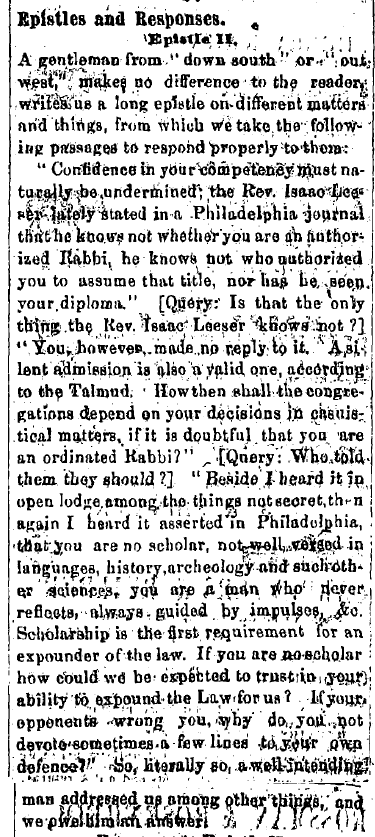

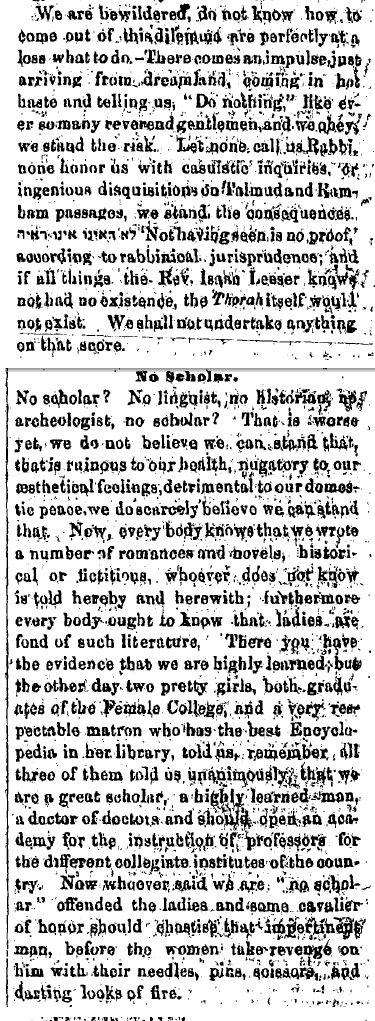
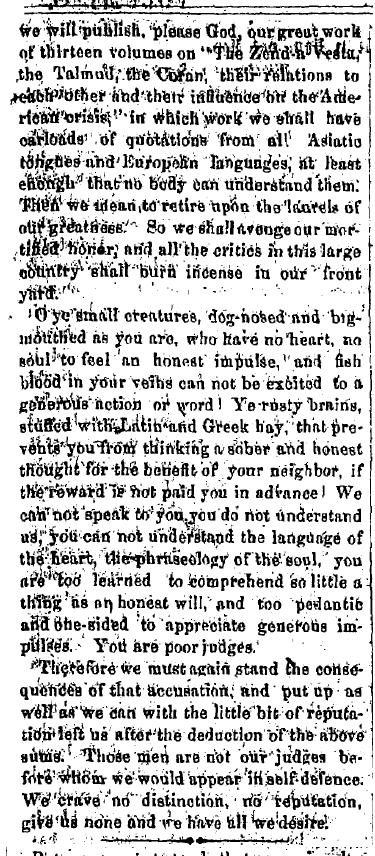
In any case, Wise had publicly been taunting Leeser's supposed lack of scholarship for years. Below is a comment that I am reasonably sure is about Leeser, from January 1858:
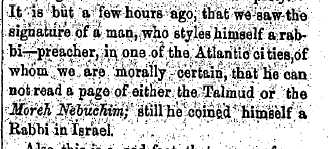
In fact true or not, Isaac Leeser did not call himself a rabbi at all.





Wow -- Minhag America in "Hamilton, C.W." -- C.W. for "Canada West". The entity known as Canada West only existed from the early 1840s until 1867. Before that it was known as Upper Canada, and since 1867 (Confederation) we know it as Ontario.
ReplyDeleteHamilton is about an hour's drive west of Toronto, at the very western tip of Lake Ontario (about 45 minutes from Buffalo, NY). Population today is about 500,000. There are two or three synagogues in operation there today, but Jewish communities in Ontario didn't get organised until fairly late, and I'm surprised to see that there was even a synagogue there in the 1860s.
the controversy over his bachlerhood was compounded, at least in earlier years, by rumors stemming from the fact that he lived in the home a christian widow and her daughter. she was the one who nursed him through his small-pox. (tragically, his brother visited him when he was sick, caught the small pox and died.)
ReplyDeleteaccording to max whiteman (whatever that's worth), he was in love in simha peixotto but her uncle would not permit them to marry.
-You see the second story as confirmation that he had semikha, albeit from another source. Isn't it possible that he didn't have it at all, hence the multiple stories?
ReplyDelete-The Jewish Observer biography of Phillip Hillel Klein states that he was attacked by Wise for falsely claiming to have a doctorate. Klein duly sent a copy of his diploma to the papers. The JO adds in parenthesis that Wise never proved that he had the doctorate he claimed. I wonder what the background is on that.
-Anyone who'd write what he did about Leeser, etc. is a nasty piece of work.
-Is Graetz implying, by her "Desdemona" remark, that black men can't be attractive?
Of course it's possible that he didn't have semicha. However, Deutsch gives a very specific source (which I didn't quote word-by-word, but I will now) and he patently ignored Wise's "official" biography which gave no source. "From Mrs. Rosa Aufrecht, the wife of Louis Aufrecht, one of the earliest teachers of the Hebrew Union College, who was among his earliest pupils in Ronsperg, Bohemia, I heard that Falk Kohn, the Kreisrabbiner of the district, bestowed on him the Morenu title. I also heard from his brother-in-law, the publisher, Edward Bloch, and from Adam Sattler, who was teacher in Radnitz, while Wise was rabbi there, that while teaching school and tutoring, Wise studied under Rabbi Falk."
ReplyDeleteThus my speculative reconstruction is that this is the semicha he had, but he himself had spread a rumor that he was ordained by Shir and the Prague Bet Din. It's like if someone got a degree from (insert college here) but was claiming a Harvard degree. Producing his actual diploma would hardly have been in his interests.
That said, it isn't as if he demonstrated that he was a talmid chochom, albeit a Reformer, like a Geiger. This seems to be what Leeser suspected, not that he really had a less impressive semicha. So sure, maybe he had none at all.
Phillip Hillel Klein is my friend Dan Klein's great-grandfather. Maybe Dan will weigh in.
There's no question that Wise exhibited a nasty streak, but it should be kept in mind that he received much nastiness too. It's kind of sad when you look at some early correspondence between him and Leeser, and it's kind of friendly.
I doubt that's what Gratz meant. I think it's just a comment on who is and isn't marriage material.
LoZ, I did not know any of that stuff. Thanks.
Fred, all you've given me is yet more second- (and third-, and fourth-) hand evidence, all of which very possibly came from Wise himself.
ReplyDeleteI've always found it funny that the campus of HUC-JIR in New York has busts of both Wises at the entrance, even though Stephen established his JIR as sort of a breakaway from HUC, with the two uniting only after he died.
Of course. There's no certificate. But Wise is not wrong that לא ראינו אינו ראיה. I would only say, as I did in my post, that Wise's reaction is a little weird. But of course that's not a proof either. The reason why I lean toward the view that Rabbi Falk Kohn ordained him is because it is so out of left field, it's not a sexy semicha, and it comes via a detailed report from those who knew him.
ReplyDeleteI see your point.
ReplyDeleteHere I am weighing in. The only information I have about Wise's run-in with my great-grandfather comes from my mother's book, "Heritage of Faith: Two Pioneers of Judaism in America" (the two pioneers being her grandfather Rabbi Dr. Philipp Klein and her father Dr. Moses L. Isaacs, whom I just mentioned in another post). I believe this was the source of the JO's account.
ReplyDeleteA footnote on p. 19 states that Wise "once attacked Dr. Klein in his newspaper, nastily questioning whether he truly possessed a doctorate. Dr. Klein was sufficiently annoyed to pen a reply, which, in characteristic fashion, noted: 'In order to save you from error, I am enclosing herewith a copy of my diploma, in which I take but a modest pride. There is but one title that I bear with a conscious pride, and that is Hillel HaKohen.'" BTW, his Ph.D. was from the U. of Jena in 1874.
Apparently this was Wise's shtick, attacking the credentials of people he didn't care for. He seems not to have believed in the adage that people who live in glass houses shouldn't throw stones. No date is given in the book, but the exchange (or at least Wise's charge) must have appeared in the Israelite some time between 1890, when R. Klein arrived in America, and Wise's death in 1900.
That's where Tonya Soloveitchik got her doctorate too, even though she was in Berlin. Did that university have some sort of distance program?
ReplyDeleteThe JO implied that he sent his response to a Jewish newspaper, maybe knowing that Wise wouldn't print it.
You can read the Jewish Observer article here. However, evidently this article appeared in 1975, while Dan's mother's book appeared in 1987 (at least according to the Library of Congress) so perhaps the JO was her source! (Except that on Google Books a search of "Jewish Observer" and "Shmuel Singer," the author, yielded no results. So in all likelihood both of them either knew it from the primary source or another source.)
ReplyDeleteIt says that he sent it to "the newspaper," which must have been the Israelite. Wise wasn't a tzadik, but why wouldn't he print it? After all, he printed the letter pressing him to produce his semicha.
What I do find interesting is the subtle, yet totally unwarranted, dig at "modern historians" in the JO piece: "Still unanswered by modern historians is: did Isaac Meyer Wise ever receive the doctoral degree he claimed for himself after his arrival in America?)"
Maybe I'm reading that wrong, but it almost seems as if Wise's dishonesty is somehow a stain on the "modern historians," like he is part of their chevra. True, writing two years later Aryeh Rubinstein flatly states that he did not receive a doctorate - maybe earlier historians left it an open question. But I would bet that Singer is sure that Wise didn't receive semicha at all, but as I said, it's possible that he did - so keeping something an open question is sometimes the right thing to pending further evidence.
I stand corrected as to the chronology of the JO article.
ReplyDeleteApparently German students used to take courses in various different universities on the way to their Ph.D.'s. And maybe there was indeed some sort of "distance program" going on. Like Mrs. Soloveitchik, R. Klein was also mainly in Berlin when he got his doctorate -- and for what it's worth, Singer has him getting his Ph.D. in 1873 from the U. of Berlin. Wish I could get my hands on the diploma that he sent to Cincinnati.
-I see your point about "modern historians," but he may just mean that literally and not pejoratively.
ReplyDelete-I seem to recall a reference to Jena as a "notorious diploma mill." It was in a Reform history, if I recall correctly, but I don't remember who they were attacking and in what period. From what I can tell, it seems a perfectly legitimate place and always has been.
-What does it mean by "a copy of my diploma?" A photograph? A photocopy?
"It is no wonder then that he would not produce his certificate. He couldn't since it didn't exist. On the other hand, he could have proved that he was ordained a rabbi, but only by showing the wrong certificate."
ReplyDeleteJohn Kerry had this same Hobson's choice during the 2004 elections. He was attacked about some of his military claims (I'm not referring to the Swift Boat veterans here) and was challenged to produce his records to back up his claims. He refused to do so. After he lost the election he did release his records, and we found out why he didnt do so until then - his grades were either the same as or worse than GWB's. Thus, he could have proved some of his claims, but only at the price of having his grades released. Since he spent so much of his time attempting to portray Bush as a fool, obviously this was not a feasible option.
That's a great analogy. I don't normally engage in what-if speculation, but since he lost anyway and many people think it was the Swift Boating that did it, likely releasing them would have killed the issue and maybe he'd have survived the other one.
ReplyDeleteSorry, I misread your comment. It wouldn't have killed the Swift Boat claims, but perhaps it would have changed perceptions about him for the positive. After all, "It exists but I'm not going to show it to you" does not appear to be very honest.
ReplyDelete